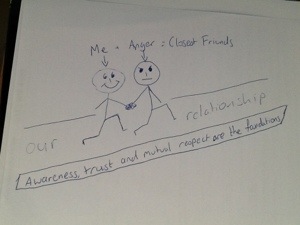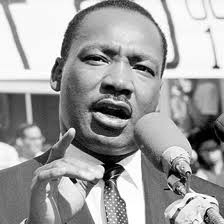 It may sound strange and it’s true. Anger is a huge part of who I am, it is part of what has got to where I am and what keeps me happy each and every day. How can that be true? Because Anger and I have a relationship that is built on awareness, trust and mutual respect.
It may sound strange and it’s true. Anger is a huge part of who I am, it is part of what has got to where I am and what keeps me happy each and every day. How can that be true? Because Anger and I have a relationship that is built on awareness, trust and mutual respect.
There is so much written that ‘sensationalises’ this emotion and some of the destructive actions and outcomes that can be created by it.
By the way, if you are yet to do so, please read a previous post titled ‘No one puts emotions in a corner’ as that helps with the definition of destructive.
When I work with individuals and groups they often talk about how Anger is a negative emotion and they wish that they didn’t feel it.
My view is completely the opposite. I need it. I will even go so far as to say I cannot live without it! The important news is that neither can you! There is an evolutionary reason for the emotion of Anger. It exists to help us thrive and survive.
Let’s look at this in a bit more detail.
The universal trigger for Anger? Interference with a goal.
The purpose of Anger? To remove that interference so the goal is achieved.
In the dim distant past of the human species this was an immensely useful emotion as it helped us fight predators, secure food, protect family/members of the tribe. In this context the emotion may well have been accompanied with some sort of display of intent (a facial expression) which may or may not lead to physical action (or what we may now describe as violence). At that point it was useful, helpful and indeed helped us thrive and survive as it either warned others off or dealt with the issue.
My thinking is also that there’s an evolutionary ‘natural selection’ element. What I mean by this is that those most adept at accessing this anger either secured the most food or protected their family/tribe most successfully. Therefore, their genes entered the gene pool and this is why we have an evolutionary reason for the display of this emotion and a reason for its presence today.
Moving on to anger in present day, what can we take from our evolutionary past and link to today?
Are there times when anger is acceptable? Our legal system believes so, else why have terms like ‘self-defence’? It is the interference with the goal (which maybe personal survival) that prompts us to access the emotion of anger which in turn activates the required parts of the body (or more specifically the Autonomic Nervous System) to allow action to occur.
In his book ‘Emotions Revealed’ (p71 footnote) Paul Ekman recounts a conversation with the Dalai Lama where he says:
‘When a person threatens our life or the lives of others, then in our anger we may be justified in harming the person that poses the threat if there is no other way to prevent injury. The Dalai Lama, with some hesitation, agrees to this point.’
What does that tell us? Context is key! What may be deemed as acceptable action in one context may be seem very different in another.
Hang on, I am yet to answer the question; ‘why do you say anger is one of your closest friends?’ So let’s do that now.
We have explored that the universal trigger for Anger is obstruction to a goal. So, what if someone have a vision for a future? A future that had the potential to bring benefits and improved living conditions for many. What if then you saw, heard and felt actions that repeatedly went against this vision and some people actually went about trying to achieve the polar opposite of your vision.
Maybe this is how Martin Luther King Jr felt. So what prompted him to action? You guessed it ……….. Anger..
Anger is a huge part in the drive for change. It motivates actions, it gives us persistence and determination as we have our goal in mind and we want to remove the barriers to that goal being achieved.
What is different in the Martin Luther King example is the way in which he expressed the emotion. In the action that he took. Crucially that action was constructive which is different from the common perception.
Bringing it back to this post, at the start I said:
‘….Anger and I have a relationship that is built on awareness, trust and mutual respect.’
If I am going to overcome all the years of evolution and choose action that is constructive (as opposed to destructive), then awareness is a vital first step. This means me taking time to identify (for example):
What triggers Anger for me.
How and where I physically experience it.
The duration it lasts.
How fast is starts and ends.
The intensity of it and where and when it changes.
This increased awareness gives me more choice about the action(s) I take and/or whether these are constructive or destructive.
The trust and respect come from the fact that this emotion exists in me for a reason, it is part of my past, present and me as a human being. I need to listen to it, trust it, respect it, then I can choose the action that may follow the emotion.
All of these things help me manage an immensely powerful emotion and why……….
Anger is one of my closest friends
How do you view anger?
What do you do to create a relationship of awareness, trust and mutual respect with your anger?

Reblogged this on ipsoscustodiet.
All right then… so you need to tell me more about this “universal trigger” malarky.
Does that mean every time someone thwarts my goal, I’m going to get angry?
Are there other circumstances? Like if someone insults me?
I had a conversation this evening about feedback I’d been given, which I got really cross about – not specifically because of the feedback it’s self, but because of the meaning I attached to the words offered.
Help me understand more?
(and BTW – loving this series)
Hi,
Thank you for the questions and I am delighted to be able to reply!
Does that mean anytime someone thwarts your goal you are going to get angry? Yes.
The variables that come into play are; the relative importance of the goal to you, the person that is doing the thwarting, what the impact of the thwarting will be.
For example; imagine the goal is to get to meet me for dinner in London on time.
Person one holds a view that timeliness is imperative and therefore being late is not an option. In this persons view, being late represents complete lack of courtesy and is rude.
Person two holds a view that timeliness is a nice to have and as long as you arrive within 30 minutes of the agreed time, that is ok. Being late represents a fact of life as you can never control all the things that hold the potential to make you late.
Then for both people, the following instance occurs:
Someone in front of you gets their suitcase caught in the gate of the tube causing a delay to your journey. This would fall within the universal trigger as the goal (arriving for dinner of time) has been interfered with.
For person one, this may manifest itself in getting quite angry (say 7/10), that the emotion happens really quickly, that the emotion lasts a while (it is still going as they are heading down the escalator to the train) and the emotion has dissipated by the time they exit the train at the destination.
For person two, this may manifest itself in getting mildly angry (say 2/10), that the emotion happens fairly quickly, the emotion is short in duration (it’s still going as they pass through the gate) and the emotion is dissipated by the time they get to the escalator.
The onset, intensity, duration and offset of the emotion will vary on the person, the trigger and the context.
Your point about the feedback illustrates that point perfectly. What ever the language was that the individual used, was a trigger for you. It may be that you have a goal that those words shouldn’t be present in feedback. Or, that in the past someone has said those words and it meant you didn’t get a piece of work or promotion. I’d need to talk to you to find out what was said and what it means to you to find the trigger. Either way, if it got you cross (angry) then there is a goal there that has been thwarted.
Are there other circumstances, like if someone insults me? Yes, and it may also trigger a different emotion too. In particular, if you found it offensive you may feel disgust too.
The other thing with emotions is that they don’t happen in a vacuum or in isolation. Using the example above (someone insults me) I may trigger anger (interference with my goal of having a positive self image) and disgust (find what has been said offensive).
Does that answer?
Let me know.
Pingback: Does HR exist to make people angry? | e3ctc·
Anger is a huge driver as well as its opposite passion. It’s what inspired James Dyson to invent the Dyson vacuum cleaner etc.